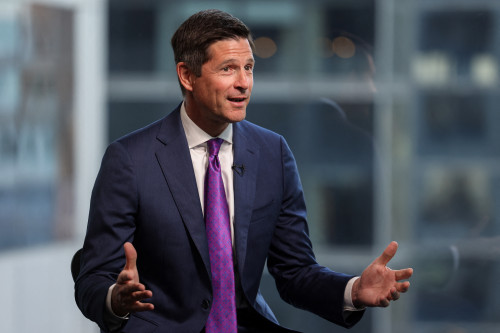By Lananh Nguyen and Suzanne McGee
NEW YORK (Reuters) -Stock investors have cut risks by selling U.S. equities and buying bonds and non-U.S. shares in response to April’s turbulent markets, Charles Schwab CEO Rick Wurster told Reuters.
“We saw clients repositioning themselves, trimming their risk a little bit, making sure they were well-diversified” in response to economic uncertainty, Wurster said in a Reuters NEXT Newsmaker interview on Thursday.
Trading volumes, which hit record levels early in April following U.S. President Donald Trump’s announcement of tariffs, tapered off as the month progressed, but client engagement has remained high, Wurster said in a wide-ranging interview.
In April, 61% of clients polled by Schwab said they were feeling bearish, compared with only 32% in the first quarter.
“We set an all-time record” for calls and client logins during the heightened volatility, Wurster said. Nervous investors are asking what they should do, while active traders are seeking an edge.
Investors also have shown renewed interest in fixed income. In the past, “it was like trying to tell someone to eat their broccoli, and now broccoli and bonds are back,” he said.
Few clients made dramatic adjustments to their asset allocations in April but those whose portfolios included non-U.S. stocks, bonds and some commodities noted they benefited from that diversification.
Schwab’s poll showed investors’ top concern was the political landscape in Washington, followed by uncertainty over market volatility or a potential correction.
The Cboe Volatility Index – an options-based barometer of investor expectations for stock market swings – closed at a five-year high in early April, before paring gains.
Wurster took the helm at Schwab on January 1 after serving as its president for three years. The brokerage, based in Westlake, Texas, serves 36.9 million brokerage accounts and holds almost $10 trillion in client assets. Schwab also helps clients manage their wealth through a network of 15,000 investment advisors.
Its clients logged in a record 500 million times in the first quarter, when it saw a record 7.4 million trades a day, company data showed. That figure hit a record of 10.7 million average daily trades during the week of April 7.
Customer service lines also received hundreds of thousands of calls a day, and readership of Schwab’s research spiked 40% in the first quarter.
The amount of margin debt that U.S. broker-dealers extended to their customers dropped to $880.3 billion in March from $918.1 billion in February, data from industry group the Financial Industry Regulatory Authority showed. That is still well above year-earlier levels of $784.1 billion.
During the market tumult, Schwab proactively reached out to clients ahead of possible future margin calls, allowing them to add money to accounts so that they were not forced to sell holdings.
“Clients appreciate the opportunity” to adjust their positions, Wurster said. “They say: ‘I don’t want to get taken out of that position, I’m going to bring in money to meet that margin call.'”
As stock trading has become more volatile, it also is taking place over more hours every day.
Once, investors large and small were confined to executing their buy or sell orders during the opening hours of the New York Stock Exchange, Nasdaq and other official exchanges from 9:30 a.m ET to 4:30 p.m ET. Then, those exchanges began offering extended early morning and late afternoon trading sessions. Now, brokerages are charging forward by offering the ability to trade overnight.
The biggest users have been retail investors, mostly outside the United States, Wurster said.
“The big thing we want to make sure happens with 24-by-five (24 hours, five days a week) trading is that the liquidity and the pricing and the efficiency of execution is there,” Wurster said.
CRYPTO SPOT TRADING
Schwab plans to offer spot crypto trading of Bitcoin and Ethereum within the next 12 months, Wurster said.
Bitcoin was one of the best-performing assets of 2024, soaring 114%, although its price has retreated 0.78% this year, even after Trump vowed to be a “crypto president.”
The Trump administration is calling for a complete overhaul of crypto investment and trading rules. Wurster hailed the administration’s loosening of crypto rules for large financial firms as a green light to expand in the market.
Still, crypto investing comes with “meaningful risks,” including huge price volatility, Wurster said. “That makes it hard for investors to understand how to allocate to it,” he added.
Schwab’s edge in the crypto business is serving investors who already own stocks and bonds and who are “intrigued” by crypto and interested in owning a little bit, rather than “crypto afficionados” eager to own dozens of coins that Schwab does not envisage supporting.
Wurster joined Schwab in 2016 after holding leadership roles at Wellington Management and McKinsey. He holds an MBA from The Tuck School of Business at Dartmouth College and a bachelor’s degree in economics from Villanova University.
His two predecessors – Walt Bettinger and founder Charles Schwab – still serve as co-chairmen of the company’s board.
The company has invested in a proposed Texas Stock Exchange alongside Wall Street giants BlackRock and Citadel Securities. If approved by the U.S. Securities and Exchange Commission, the TXSE could open its doors by the end of this year, aiming to compete with incumbents Nasdaq and the New York Stock Exchange that have long dominated the industry, including in IPOs.
“We think it’s good to have a range of options and for there to be competition amongst the exchanges,” Wurster said.
(Reporting by Lananh Nguyen and Suzanne McGee; Additional reporting by Saeed Azhar, Hannah Lang, Saqib Ahmed and Lewis Krauskopf; Editing by Susan Fenton)





